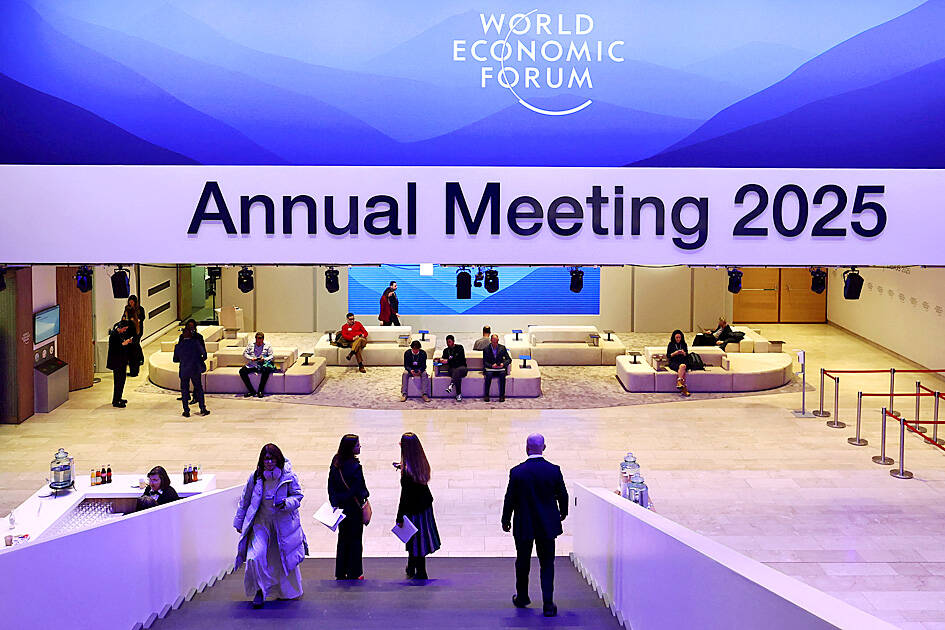A global inflation scare and concerns that economic shifts would erode jobs are feeding perceptions that the world is becoming increasingly unfair, threatening civil unrest as a response, communications firm Edelman says.
The world has entered an “age of grievance,” Edelman chief executive officer Richard Edelman said.
He cited a survey conducted from Oct. 25 to Nov. 16 last year among more than 33,000 respondents in 28 nations that found an unprecedented lack of faith in governments, business leaders and the media.

Photo: Reuters
About two-thirds of respondents said they feel discriminated against, up 10 percentage points in a year. Three-quarters of respondents worry about their pay not keeping up with inflation, while about 60 percent are concerned about job losses due to international trade conflicts, economic pressures or artificial intelligence.
Only 36 percent believe that things would be better for the next generation.
Last year saw governments across the world being ousted in elections, reflecting deep-running dissatisfaction with established regimes. Populists critical of established leaders have emerged as winners — with potentially grave consequences for so-far unquestioned economic models and social rules.
More than half of survey respondents believe that capitalism does more harm than good, including 55 percent of 18-to-34 year olds. The majority of young adults also consider disinformation, online attacks, or violence to persons or property an appropriate way to bring about change.
Survey results show a correlation between trust and economic growth that explains why Saudi Arabia, the United Arab Emirates and India consistently show high levels of institutional trust — while the opposite is true for nations including Germany, Japan and South Korea, where governments are experiencing economic and political travails.
“The most pressing need is to restore economic optimism,” Edelman said. “Our research tells us that when people see solutions, they’re more hopeful and willing to sacrifice for the greater good. When trust is earned, optimism grows.”
The report comes just ahead of the World Economic Forum’s annual meeting in Davos, Switzerland, this week.
The forum’s risk report, published last week, showed misinformation and disinformation were policymakers’ primary concerns on a two-year horizon.

Sweeping policy changes under US Secretary of Health and Human Services Robert F. Kennedy Jr are having a chilling effect on vaccine makers as anti-vaccine rhetoric has turned into concrete changes in inoculation schedules and recommendations, investors and executives said. The administration of US President Donald Trump has in the past year upended vaccine recommendations, with the country last month ending its longstanding guidance that all children receive inoculations against flu, hepatitis A and other diseases. The unprecedented changes have led to diminished vaccine usage, hurt the investment case for some biotechs, and created a drag that would likely dent revenues and

Macronix International Co (旺宏), the world’s biggest NOR flash memory supplier, yesterday said it would spend NT$22 billion (US$699.1 million) on capacity expansion this year to increase its production of mid-to-low-density memory chips as the world’s major memorychip suppliers are phasing out the market. The company said its planned capital expenditures are about 11 times higher than the NT$1.8 billion it spent on new facilities and equipment last year. A majority of this year’s outlay would be allocated to step up capacity of multi-level cell (MLC) NAND flash memory chips, which are used in embedded multimedia cards (eMMC), a managed

CULPRITS: Factors that affected the slip included falling global crude oil prices, wait-and-see consumer attitudes due to US tariffs and a different Lunar New Year holiday schedule Taiwan’s retail sales ended a nine-year growth streak last year, slipping 0.2 percent from a year earlier as uncertainty over US tariff policies affected demand for durable goods, data released on Friday by the Ministry of Economic Affairs showed. Last year’s retail sales totaled NT$4.84 trillion (US$153.27 billion), down about NT$9.5 billion, or 0.2 percent, from 2024. Despite the decline, the figure was still the second-highest annual sales total on record. Ministry statistics department deputy head Chen Yu-fang (陳玉芳) said sales of cars, motorcycles and related products, which accounted for 17.4 percent of total retail rales last year, fell NT$68.1 billion, or

In the wake of strong global demand for AI applications, Taiwan’s export-oriented economy accelerated with the composite index of economic indicators flashing the first “red” light in December for one year, indicating the economy is in booming mode, the National Development Council (NDC) said yesterday. Moreover, the index of leading indicators, which gauges the potential state of the economy over the next six months, also moved higher in December amid growing optimism over the outlook, the NDC said. In December, the index of economic indicators rose one point from a month earlier to 38, at the lower end of the “red” light.